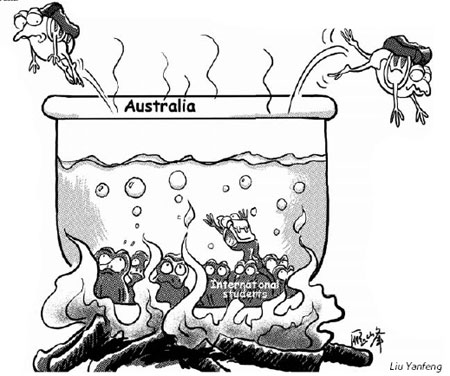
|
BIZCHINA> Review & Analysis
 |
|
Int'l frogs boiling in melting pot
By Shen Gang (China Daily)
Updated: 2009-09-19 08:20 Some 547,000 overseas students help to create a 15.5 billion-Australian-dollar annual industry for Australia. But the country's third-largest export, following only coal and iron ore exports, is under threat by a re-emergence of racist attitudes against international students. Hundreds of students took to the streets on September 2 in Sydney to once again protest against racism. They urged the Australian government to seriously heed students' grievances over issues such as safety, accommodations, visas, transport concessions and unreliable institutions. None of these problems are new. The inefficient bureaucracy system and ingrained racism in Australia have kept all of these problems unresolved. The situation is similar to putting a frog in slowly heated water. International students are not the only frog in the hot pot and they will likely hop out if the situation worsens. Ultimately, the Australian economy will be the victim of the boiling water. International students asked for transportation concessions 20 years ago. However, Victoria and New South Wales, where the majority of international students in the country live, still refuse to grant concessions to international students. In fact, compared to the exceedingly high tuition fees that international students pay, transport concession is only a symbolic treatment of fairness.
 The students' concern over safety broke out in May, when Indian students protested against a series of violent attacks in Melbourne and Sydney. The Australian government and police argued that no evidence showed these attacks were related to racism or discrimination. Politically, they were right. However, they ignored some important facts. Because of limited on-campus accommodations, many international students live in unfamiliar suburbs far away from universities. Walking alone at night, the students, with cash in wallets and little knowledge of the legal system, are easy targets. Many international students do not report to the police when robbed or attacked if they were not seriously hurt, because in such a culturally and linguistically diversified country, only few Australian police officers understand foreign languages. The authorities unsuccessfully tried to shield the education industry by burying important statistics. The Age unveiled that details of the deaths of more than 50 overseas students last year have been suppressed. People are concerned the death toll is higher than the Australian government has admitted.
The tough situation that international students face has drawn global attention, especially in China and India, the two largest sources of international students. The Indian government has warned students to seriously think about the risks of studying in Australia. Chinese parents are also concerned whether it is worth it to send their only child to the country. The Indian student market has already exhibited negative signs, with the recruitment body IDP Education Australia reporting an 80 percent year-on-year drop in appointments by students in August. The potential economic loss in just New South Wales alone could be as high as A$300 million. It is commendable to see some universities taking action. Some have enhanced security patrol and some, like the University of Sydney, have started to provide a free shuttle service at night between railway stations and the campus. Julia Gillard, the Australian minister for education, announced recently that all education providers for overseas students would need to re-register under tighter security criteria by December 31 next year. She said this would restore confidence. She also called for the International Student Roundtable, which recently invited 31 international student delegates to discuss related issues in Canberra. However, many of the practical measures will be put into practice as early as 2010 because of the legislative process. It might be too late. The University of Melbourne recently announced it would cut 220 jobs partly because of economic losses. The University of Sydney announced similar job cuts and slashes in the number of courses offered. Many private colleges are at the precipice of closing down because of financial problems. Dr Michael Spence, principal and vice-chancellor of the University of Sydney, said: "I don't think the water is getting hotter and hotter. I think it is getting cooler and cooler." We hope so. To be frank, no frog wants to be cooked. But the decrease of international students this semester indicates that though spring has sprung in Australia, a winter for the country's education industry might just start. (For more biz stories, please visit Industries)
|